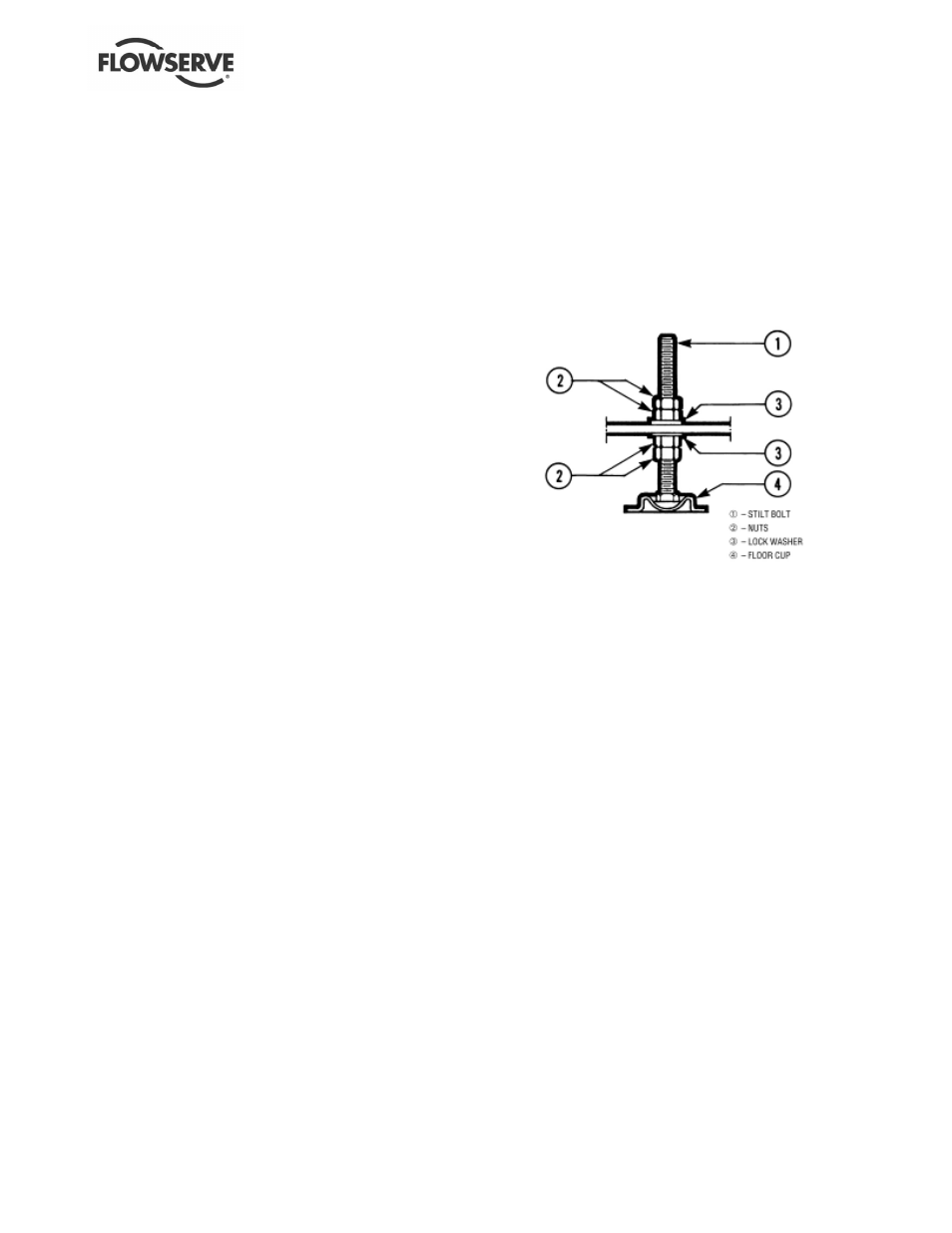Flowserve Mark 3 Sealed Metallic Durco User Manual
Page 20

MARK 3 USER INSTRUCTIONS ENGLISH 71569102 01-13
Page 20 of 72
flowserve.com
this is the tolerance to which we supply our
standard baseplate. Some users may desire an
even flatter surface, which can facilitate
installation and alignment. Flowserve will supply
flatter baseplates upon request at extra cost. For
example, mounting surface flatness of 0.17
mm/m (0.002 in./ft) is offered on the Flowserve
Type E “Ten Point” baseplate shown in figure 4-1.
3. The baseplate must be designed to allow the
user to final field align the pump and driver to
within their own particular standards and to
compensate for any pump or driver movement
that occurred during handling. Normal industry
practice is to achieve final alignment by moving
the motor to match the pump. Flowserve practice
is to confirm in our shop that the pump assembly
can be accurately aligned. Before shipment, the
factory verifies that there is enough horizontal
movement capability at the motor to obtain a
“perfect” final alignment when the installer puts
the baseplate assembly into its original, top
leveled, unstressed condition.
4.4 Baseplate Mounting
4.4.1
Stilt and spring mounted baseplates
Flowserve offers stilt and spring mounted baseplates.
(See figure 4-2 for stilt mounted option.) The low
vibration levels of Mark 3 pumps allow the use of
these baseplates - provided they are of a rigid design.
The baseplate is set on a flat surface with no tie down
bolts or other means of anchoring it to the floor.
General instructions for assembling these baseplates
are given below. For dimensional information, please
refer to the appropriate Flowserve “Sales print.”
Stilt mounted baseplate assembly
4.4.1.1
instructions
Refer to figure 4-3.
a)
Raise or block up baseplate/pump above the
floor to allow for the assembly of the stilts.
b)
Predetermine or measure the approximate
desired height for the baseplate above the floor.
c)
Set the bottom nuts [2] above the stilt bolt head
[1] to the desired height.
d)
Assemble lock washer [3] down over the stilt bolt.
e)
Assemble the stilt bolt up through hole in the
bottom plate and hold in place.
f)
Assemble the lock washer [3] and nut [2] on the
stilt bolt. Tighten the nut down on the lock
washer.
g)
After all four stilts have been assembled,
position the baseplate in place, over the floor
cups [4] under each stilt location, and lower the
baseplate to the floor.
h)
Level and make final height adjustments to the
suction and discharge pipe by first loosening the
top nuts and turning the bottom nuts to raise or
lower the baseplate.
i)
Tighten the top and bottom nuts at the lock
washer [3] first then tighten the other nuts.
j)
It should be noted that the connecting pipelines
must be individually supported, and that the stilt
mounted baseplate is not intended to support
total static pipe load.
Figure 4-3
Stilt/spring mounted baseplate assembly
4.4.1.2
instructions
Refer to figure 4-4.
a)
Raise or block up baseplate/pump above the
floor to allow for the assembly of the stilts.
b)
Set the bottom nuts [4] above the stilt bolt head
[1]. This allows for 51 mm (2 in.) upward
movement for the final height adjustment of the
suction/discharge flange.
c)
Assemble the lock washer [6] flat washer [5] and
bottom spring/cup assembly [2] down over the
stilt bolt [1].
d)
Assemble the stilt bolt/bottom spring up through
hole in the bottom plate and hold in place.
e)
Assemble top spring/cup assembly [3] down
over stilt bolt.
f)
Assemble flat washer [5], lock washer [6] and
nuts [4] on the stilt bolt.
g)
Tighten down top nuts, compressing the top
spring approximately 13 mm (0.5 in.). Additional
compression may be required to stabilize the
baseplate.
h)
After all four stilts have been assembled,
position the baseplate in place, over the floor
cups [7] under each stilt location, and lower the
baseplate down to the floor.
i)
Level and make final height adjustments to the
suction and discharge pipe by first loosening the
top nuts, and turning the bottom nuts to raise or
lower the baseplate.